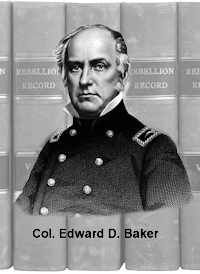Camp at New Market Bridge, March 26, 1862.
 Dear Hannah, — We shall probably start to-morrow morning for Big Bethel, which we shall occupy and I think without a battle. A reconnoissance was made today, but very few of the enemy were seen. We arrived here yesterday, and are encamped about 6 miles from Fortress Monroe, and 3 miles from Newport News. The country is very level and sandy, pines growing in great abundance. We selected a very pleasant place before a burnt house, on a grass plot, and pitched our tents there. Our pickets were thrown forward about quarter of a mile along the banks of a stream, which branches out from Back River. I wish you could see some of the scenes of camp life. There are so many of them queer, and at the same time beautiful, that I know you would be pleased with them. To-night I was struck by one in particular. We have a large fire kept burning outside our tents all the time, around which we all of us frequently gather. Tonight about 7 o’clock we were all around the fire in various attitudes, some sitting, others standing, etc., generals, colonels, etc., in fact all grades down to privates were represented. A guard brought in two negroes from Yorktown, they having made their way up to our lines. As soon as they had been questioned by the general, some one gave them some crackers, and down they dumped themselves on a pile of wood close by the blazing fire. It was a scene worth witnessing. The officers and servants, some mounted and some not, scattered around in every way imaginable, and these two contrabands, the picture of perfect contentment, notwithstanding the sufferings they had just gone through. Footsore, famished, and their clothes in tatters, they had escaped from Yorktown where they had been working on fortifications, with a band of seven others. Two were shot by the rebels and one wounded. Two are now wandering in the woods, and two have arrived here.
Dear Hannah, — We shall probably start to-morrow morning for Big Bethel, which we shall occupy and I think without a battle. A reconnoissance was made today, but very few of the enemy were seen. We arrived here yesterday, and are encamped about 6 miles from Fortress Monroe, and 3 miles from Newport News. The country is very level and sandy, pines growing in great abundance. We selected a very pleasant place before a burnt house, on a grass plot, and pitched our tents there. Our pickets were thrown forward about quarter of a mile along the banks of a stream, which branches out from Back River. I wish you could see some of the scenes of camp life. There are so many of them queer, and at the same time beautiful, that I know you would be pleased with them. To-night I was struck by one in particular. We have a large fire kept burning outside our tents all the time, around which we all of us frequently gather. Tonight about 7 o’clock we were all around the fire in various attitudes, some sitting, others standing, etc., generals, colonels, etc., in fact all grades down to privates were represented. A guard brought in two negroes from Yorktown, they having made their way up to our lines. As soon as they had been questioned by the general, some one gave them some crackers, and down they dumped themselves on a pile of wood close by the blazing fire. It was a scene worth witnessing. The officers and servants, some mounted and some not, scattered around in every way imaginable, and these two contrabands, the picture of perfect contentment, notwithstanding the sufferings they had just gone through. Footsore, famished, and their clothes in tatters, they had escaped from Yorktown where they had been working on fortifications, with a band of seven others. Two were shot by the rebels and one wounded. Two are now wandering in the woods, and two have arrived here.
If the Merrimac comes out again she will never return. We have a plan to capture her, which I believe is as follows: Five large steamers are selected, to run her down all at once, and sink her. They say she cannot possibly stand the shock, and will be stove in. I hope so at any rate. It will be an expensive operation, but those who ought to be well informed about her, do not seem to be at all alarmed about her.
We have quite warm weather here, although it is damp in our tents, because we have no fires. I am careful, however, and get on first rate. I have had no letters from home for some days, and shall not have any for some time to come, I imagine. You had better direct all letters to Fortress Monroe, Gen. F. J. Porter’s headquarters. I shall get them much sooner that way. . . .


